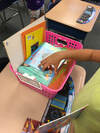 While reading Norman Fischer’s book, When You Greet Me I Bow: Notes and Reflections from a Life in Zen, I was struck by the phrase “culture of practice.” Fischer uses it to describe how Zen Buddhist’s go about cultivating enlightenment, reminding the reader that practitioners don’t magically transport themselves to greater compassion, open heartedness and enlightenment. “No,” Fischer says, “The entire culture of practice is necessary… including meditation, study, relationships, ritual, and much more.” My mind quickly jumped to the world of teaching. Aren’t we engaged in creating a culture of practice in our classroom? And aren’t we, step by step over time, leading students to a form of enlightenment, including an illumination of how reading and writing work, a comprehension of all types of text, and a deeper insight into the world around them? For me, the answer is yes! At first blush, it seems like a lot to master. But with repeated practice, good teaching habits take root and grow. And if I focus on activities rather than passive worksheets and lectures, incorporating everything isn’t so daunting. For example, here’s a list of activities that, when used in combination over the course of a week (and a month and the year), help to create fluent readers, writers, and spellers:
 Reading books of choice, pulled from easily accessible bins and boxes (grouped by genre, author, and/or theme). Like writing on topics you choose, reading a book you choose fosters engagement and motivation. What about the strategies students use to solve problems and deepen their understanding? It’s another long list but I think we can identify some especially important ones:
Wow, our lists are getting long! And we still haven’t covered the “entire culture of practice.” What about the rituals and relationships Fischer mentioned? Stay tuned for Part Two! |
Mark WeaklandI am a teacher, literacy consultant, author, musician, nature lover, and life long learner.
|
 RSS Feed
RSS Feed